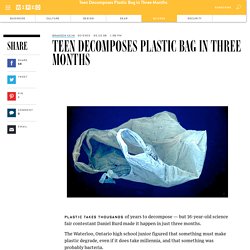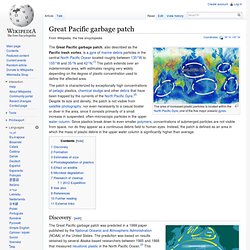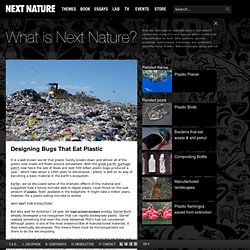

Teen Decomposes Plastic Bag in Three Months. Plastic takes thousands of years to decompose — but 16-year-old science fair contestant Daniel Burd made it happen in just three months.

The Waterloo, Ontario high school junior figured that something must make plastic degrade, even if it does take millennia, and that something was probably bacteria. (Hey, at between one-half and 90 percent of Earth’s biomass, bacteria’s a pretty safe bet for any biological mystery.) The Record reports that Burd mixed landfill dirt with yeast and tap water, then added ground plastic and let it stew. The plastic indeed decomposed more quickly than it would in nature; after experimenting with different temperatures and configurations, Burd isolated the microbial munchers. One came from the bacterial genus Pseudomonas, and the other from the genus Sphingomonas.
Amazing stuff. Image: Andrew Green See Also: Great Pacific Garbage Patch. The area of increased plastic particles is located within the North Pacific Gyre, one of the five major oceanic gyres.

The Great Pacific garbage patch, also described as the Pacific trash vortex, is a gyre of marine debris particles in the central North Pacific Ocean located roughly between 135°W to 155°W and 35°N and 42°N.[1] The patch extends over an indeterminate area, with estimates ranging very widely depending on the degree of plastic concentration used to define the affected area. The patch is characterized by exceptionally high concentrations of pelagic plastics, chemical sludge and other debris that have been trapped by the currents of the North Pacific Gyre.[2] Despite its size and density, the patch is not visible from satellite photography, nor even necessarily to a casual boater or diver in the area, since it consists primarily of a small increase in suspended, often-microscopic particles in the upper water column.
Discovery[edit] Charles J. Formation[edit] In 2012, Miriam C. Boy discovers microbe that eats plastic. It's not your average science fair when the 16-year-old winner manages to solve a global waste crisis. But such was the case at last May's Canada-Wide Science Fair in Ottawa, Ontario, where Daniel Burd, a high school student at Waterloo Collegiate Institute, presented his research on microorganisms that can rapidly biodegrade plastic. Daniel had a thought it seems even the most esteemed PhDs hadn't considered. Plastic, one of the most indestructible of manufactured materials, does in fact eventually decompose. It takes 1,000 years but decompose it does, which means there must be microorganisms out there to do the decomposing. Editor's note: There are two high school students who have discovered plastic-consuming microorganisms.
Could those microorganisms be bred to do the job faster? The preliminary results were encouraging, so he kept at it, selecting out the most effective strains and interbreeding them. Plastic eating bacteria. Designing Bugs that eat Plastic. It is a well known secret that plastic hardly breaks down and almost all of the plastic ever made still floats around somewhere.

With the great pacific garbage patch now twice the size of Texas and over 500 billion plastic bags produced a year – which take about a 1000 years to decompose – plastic is well on its way of becoming a basic material in the Earth’s ecosystem. Earlier, we’ve discussed some of the dramatic effects of this material and suggested how a future microbe able to digest plastic could thrive on the vast amount of plastic ‘food’ available in the biosphere. It might take a million years, however, for a plastic-eating microbe to evolve. But why wait for evolution? 16-year old high school student prodigy Daniel Burd already developed a microorganism that can rapidly biodegrade plastic.
Daniel presented a his results at the Canadian Science Fair in Waterloo, Ontario where he won the first price for his study. Plastic-eating bacteria found in 'ocean desert,' scientist says. Scientists have found an organism that may be eating plastic in the ocean, according to a report in Nature News.

But whether the bug is green or mean remains to be seen, a scientist told CNN on Wednesday. It has been proven that microbes can degrade plastic, said marine microbiologist Tracy Mincer of the Woods Hole Oceanographic Institution in Massachusetts. What's significant is that the plastic is being degraded in a nutrient-poor area of the sea, an "ocean desert," Mincer said.